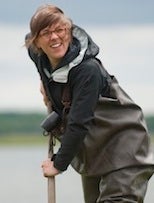
Millions of gallons of oil had already flowed into the Gulf of Mexico when Mother Jones reporter Kate Sheppard attended Metcalf Institute’s Science Immersion Workshop for Journalists in June of 2010. At the time, she was knee deep in reporting on the worst oil spill in U.S. history and one of the biggest stories of her career.
“I think what shocked me most about the spill was just how long it went on,” said Sheppard. “Like many people, I assumed that if we had the technology to drill that deep in the Gulf, we would have the technology to prevent or at least fix a spill, too. I was also shocked by how many warning signs were ignored, and about how complacent [we seemed to have become] on safety, both on the rig and in our regulatory system.”
Sheppard’s oil spill coverage focused on issues related to policy and government regulation. She also reported on the government’s apparent lack of oversight of the use of chemical dispersants to clean up the spill.
This is an excerpt from an article Sheppard wrote for Mother Jones in August of 2010:
“Why, might you ask, was BP able to pump the Gulf full of chemicals that have never been tested for their human and environmental safety? The answer lies, in part, in the Toxic Substances Control Act, the 34-year-old law that governs the use of tens of thousands of hazardous chemicals.”
Sheppard says the hands-on training she received during Metcalf’s weeklong workshop that put her in the field and the laboratory with leading scientists helped give her the tools to accurately cover the massive spill.
“This was really a great way to get more versed in the science so that I could explain it to readers and it empowered me to do more writing about the science of the spill,” said Sheppard.
She went on to win awards from the Society of Environmental Journalists and the Online News Association or her coverage of the Deepwater Horizon spill.
Sheppard, who now covers the environment, energy and health for Mother Jones, says she recommends the Science Immersion Workshop to fellow journalists all the time. “The workshop is great for people who have journalism degrees, but not a background in science and want to cover the environment in a more responsible way.”
Read More Alumni Profiles